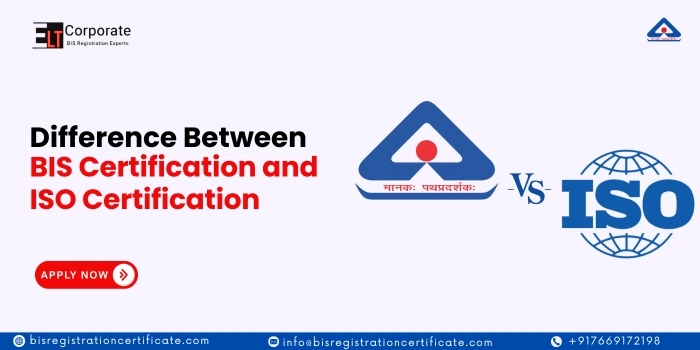The Bureau of India Standards (BIS) certifies products to ensure they meet Indian safety and quality standards. BIS certification is mandatory for certain items, such as electrical appliances and packaged goods. ISO Certification, provided by the International Organisation for Standardisation, ensures that a company’s processes meet global standards for quality, safety, and efficiency. Unlike BIS, ISO certification is usually voluntary and recognised worldwide.
What is BIS Certificate?
A BIS Certificate is provided by the Bureau of Indian Standards to ensure products meet quality and safety standards in India. It is mandatory for certain items like electronic appliances and construction materials. Different types exist, such as ISI for domestic products, CRS for electronics, and FMCS for foreign manufacture. BIS certification helps ensure consumer safety, product reliability, and legal compliance.
Key Features BIS Certificate
Below, we mentioned some key features of the BIS Certificate:
- Government-regulated and mandatory for specific product categories (e.g electrical appliances, cement, steel).
- Product-specific certification.
- Based on Indian Standards (IS).
- BIS offers schemes like the ISI Mark, FMCS (Foreign Manufacture Certification Scheme), and CRS
Read More: Introduction To Bureau Of Indian Standards
What is ISO Certificate?
The International Organisation for Standardisation is a global non-governmental organisation comprised of national standardisation bodies. It is responsible for creating various commercial and industrial standards aimed at promoting better manufacturing practices that prioritise customer satisfaction and product quality. As of 2022, ISO has 167 member countries and is headquartered in Geneva, Switzerland.
Key Features ISO Certificate
Below, we mentioned some key features of the ISO Certificate:
- Voluntary in most cases.
- Focuses on management systems (e.g., ISO 9001 for quality, ISO 14001 for environmental, ISO 27001 for information security)
- Recognised globally.
- Promotes process improvement and customer satisfaction.
What is the Difference Between BIS and ISO?
The Bureau of Indian Standards and the International Organisation for Standardisation are both organisations that develop and publish standards for a wide range of products and services. However, there are a few key differences between the two:
| Feature | BIS (Bureau of Indian Standards) | ISO (International Organization for Standardization) |
|---|---|---|
| Scope | National (India) | International (Global) |
| Headquarters | New Delhi, India | Geneva, Switzerland |
| Founded | 1986 (through BIS Act) | 1947 |
| Main Focus | Indian standards, product certification | International standards, system certification |
| Certification Marks | ISI mark, Hallmark | ISO certification (e.g., ISO 9001) |
| Industry Coverage | Agriculture, engineering, consumer goods etc. | Almost all industries globally |
| Government Affiliation | Government of India | Independent, member-driven |
Why Are BIS Certification and ISO Certification Important?
The BIS, known as the Bureau of India Standards, is capable of creating and sharing measures for a wide range of items and services in India. Indeed, even though BIS measures are ordinarily international, the government might now and then enforce them as mandatory.
Products are required by the government to get a BIS certification for certain items; sometimes, recently, they can be sold in India. This is known as the mandatory registration scheme, and it incorporates items such as toys, electrical gadgets, and telecommunications equipment. Before being sold in India, these items must undergo testing and get approval from BIS.
While ISO standards are not officially recognised in India, the government and trade sector commonly use them as the basis for local and global controls. Many Indian companies have chosen to actualise ISO standards to enhance their competitive edge in the global marketplace and demonstrate their commitment to greatness.
ISO/IEC 27001, ISO 9001, and ISO 14001 are commonly utilised in India to progress operations, increase client fulfilment, and demonstrate follow with worldwide standards in information security, quality, and environmental management systems.
Conclusion
In conclusion, ISO and BIS have different scopes, focuses, organisational structures, and certification programs. While ISO is an international organisation that creates and promotes standards for a wide range of industries and sectors, BIS is a national organisation that primarily sets standards for industries and sectors within India. Understanding the difference between ISO and BIS, the two organisations, is essential for businesses and individuals to make informed decisions about which standards to follow and which certification to pursue.
How Long Does It Take To Get BIS Certification?
The timeline varies depending on the product category, documentation accuracy, and testing requirements, but generally, it can take 4–8 weeks.
Can BIS Certification Consultants Help With Foreign Manufacturers?
Yes, many consultants assist foreign manufacturers in obtaining BIS certification under the Foreign Manufacturers Certification Scheme.
Can I Apply For BIS Certification Without A Consultant?
Yes, but the process can be complex and time-consuming. Consultants help reduce errors, speed up the process, and ensure compliance.








